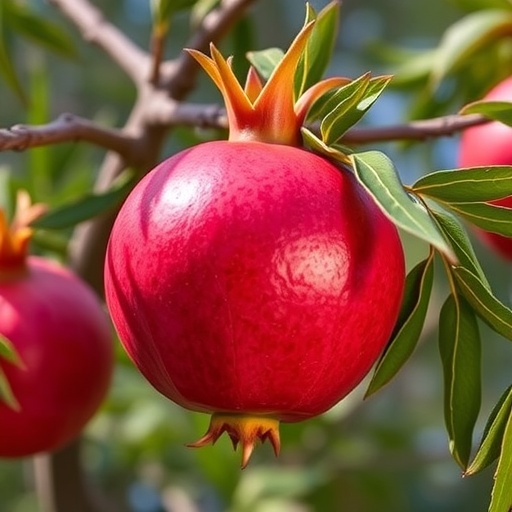In a groundbreaking study poised to redefine our understanding of pomegranate cultivation, researchers have delved into the genomes of two vital pomegranate species: the domesticated variety, Punica granatum L. cv. ‘Wonderful’, and the wild ancestor, P. protopunica. This pivotal research, led by a team of geneticists and botanists, has equipped the scientific community with unprecedented insights into the genetic mechanisms underlying pomegranate domestication. The findings are not only crucial for horticultural practices but also illuminate the broader implications of plant genetic evolution and the adaptive changes that have ensued over thousands of years.
Pomegranates, revered for their nutritional and medicinal properties, have been cultivated for millennia, symbolizing prosperity and fertility in various cultures. The research led by Alex Slonimsky and colleagues provides a comprehensive genomic analysis that traces the lineage of cultivated pomegranates back to their wild ancestors. By sequencing the genomes of both P. granatum and P. protopunica, the researchers have unearthed critical genetic variations that may have influenced their respective adaptations, growth rates, and yield potentials.
One of the most striking revelations of this study is the identification of specific genes involved in fruit development and ripening. These gene variants not only elucidate how cultivated pomegranates have been tailored through selective breeding over centuries but also hint at the underlying resistance mechanisms that wild pomegranates exhibit against environmental stresses. The comparative genomic approach reveals a plethora of genetic adaptations that have enabled the ‘Wonderful’ cultivar to thrive in various climates, making it one of the most popular pomegranate varieties globally.
Moreover, the research challenges conventional perspectives on domestication. The team posed an intriguing question: is the so-called “Daru” a wild stock? This inquiry opened the door to a deeper exploration of the relationships among different pomegranate varieties and their wild relatives. As scientists examine the genetic hallmarks of these plants, the insights gleaned may inform better breeding strategies to enhance resilience and fruit quality, crucial as climate change poses new challenges to agriculture.
The significance of this genomic study extends beyond mere curiosity. It holds the potential to revolutionize pomegranate cultivation practices. By understanding the genetic basis for traits such as drought resistance and disease tolerance, agronomists can leverage these insights to develop new cultivars that can be cultivated economically in diverse environmental conditions. This leap forward is particularly vital as global food security concerns mount, underscoring the importance of sustainable agricultural innovations.
Additionally, the research underscores the importance of biodiversity in agriculture. By examining wild relatives like P. protopunica, researchers can identify genetic resources that may be integral for breeding programs that aim to introduce beneficial traits into domestic varieties. As the study illustrates, preserving wild populations is essential not only for ecological balance but also for the genetic resilience of cultivated species.
Moreover, the project was fueled by advancements in genomic technologies that allow for high-throughput sequencing and analysis, empowering researchers to decode complex plant genomes more efficiently. This technological leap has made it feasible to explore a wider array of plant species, realizing the potential to unearth hidden genomic secrets that could be employed to tackle some of modern agriculture’s most pressing challenges.
As more plant genomes are sequenced, the wealth of comparative data available to researchers will expound our understanding of plant biology significantly. This avalanche of genetic information provides a fertile ground for future studies that may link specific genes to desirable agronomic traits. The continual intersection of genomics and agriculture heralds a new era where informed breeding practices can lead to crops that are not only more productive but are also sustainable and resilient to environmental changes.
As the dialogue surrounding sustainable farming practices gains momentum, findings from this research will undoubtedly contribute to broader discussions regarding agricultural biodiversity, the ethics of genetic modification, and the future of food production. The intersection of plant genetics with ecological principles is key to advancing our methods while respecting the intricate balance of our ecosystems.
Finally, this study has sparked interest among not only the academic community but also the general public, emphasizing the role of pomegranates in culture, cuisine, and health. Social media platforms are abuzz with excitement as food enthusiasts and health advocates cite the benefits of pomegranates while discussing the implications of the study, driving even more dialogue around its findings.
Through rigorous genetic exploration, researchers have opened up new vistas for cultivating pomegranates that can meet the demands of a growing global population while addressing pressing environmental challenges. This exploration into the genomes of pomegranates not only serves as a testament to the legacy of agricultural science but also ignites a vision for its future, highlighting the symbiotic relationship between nature and science.
In conclusion, understanding the genetics behind domesticated pomegranates compared to their wild counterparts presents a significant opportunity to fortify the agricultural landscape. As researchers continue to decipher the complex narrative laid out in our plants’ DNA, the pomegranate stands as a poignant symbol of both an ancient lineage and a bright future in sustainable agriculture.
Subject of Research: The genomic analysis of cultivated and wild pomegranates to understand domestication.
Article Title: The pomegranate (Punica granatum L. cv. ‘Wonderful’) genome and P. protopunica shed light on pomegranate domestication. Is Daru a wild stock?
Article References:
Slonimsky, A., Lovky, O., Harel-Beja, R. et al. The pomegranate (Punica granatum L. cv. ‘Wonderful’) genome and P. protopunica shed light on pomegranate domestication. Is Daru a wild stock?.
BMC Genomics 26, 928 (2025). https://doi.org/10.1186/s12864-025-11993-0
Image Credits: AI Generated
DOI:
Keywords: Pomegranate, Genomics, Domestication, Agriculture, Biodiversity, Sustainable Farming




